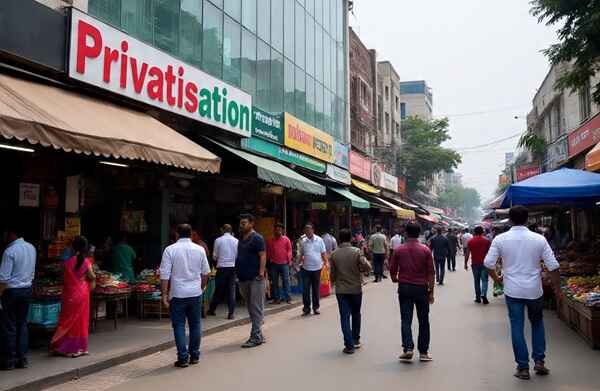The practice of dictatorship is not new. It is the process where an individual, male or female figure controls all kinds of administrative powers in a country, or region, in a small group or a huge population. History is witness of many such dictatorships, but most of the times, it is seen that the times of these dictators were the times of oppression and authoritarianism. While an worldwide argument continues regarding whether dictatorship is acceptable or not, we lay before you the advantages and disadvantages of the process.
Advantages of Dictatorship Quick Choices:
Dictatorships allow swift, decisive action. Since one person or group has ultimate authority, dictatorships avoid the need for protracted disputes and consensus-building. This quick decision-making process is beneficial in urgent circumstances.

A dictatorship gives the leader complete authority without checks and balances that slow democracy. This allows policies and initiatives to be enacted rapidly without bureaucracy or protracted legislative disputes. A dictatorship’s concentrated authority may be advantageous during natural disasters, security threats, or economic calamities.
1. Political stability:
Political stability is another authoritarian advantage over democracies. Democratic governments are more prone to deadlock, party strife, and political standstill than dictatorships. A single leader or small elite rules under dictatorships, removing political differences that hinder democratic governments.
Political instability and impasse may come from extended group and party talks in democracies. In contrast, dictatorships may be stable. This stability may appeal to individuals who prefer order and predictability over democratic upheaval.
- Also Read: Military Rule Advantages and Disadvantages
2. Economics of development:
Economic development has surged during dictatorships. Centralised authorities can swiftly execute economic reforms, attract foreign investment, and allocate resources to support economic growth. Economic development has been strong in authoritarian China and Singapore.
Power concentration makes long-term economic initiatives easy to execute. Government projects may be conducted without political controversy or leadership changes. This simpler approach to economic development may attract foreign investors, enhance local industries, and increase public economic growth.
3. Security and order:
Many dictatorships maintain order and security inside their borders. Concentration of power provides strict law enforcement and swift punishment for illicit action, enhancing public security. This appeal to people who favor safety and stability above political liberty may justify the regime.
Dictatorships can promptly and forcibly address security problems while controlling the military and police. Strong security may deter crime and maintain order. This may make occupants feel safer and less anxious about disturbances.
4. Build infrastructure:
Massive infrastructure projects show dictatorships’ power and win support. Roads, bridges, public facilities, and other infrastructure may be built. These initiatives may improve transportation, urban development, and living conditions.
These infrastructure projects may demonstrate authoritarian leaders’ concern for people. They may also represent progress and modernism, bolstering the regime’s image. Better transportation, access to important services, and a better urban environment may improve quality of life.
Dictatorships can speed up decision-making, maintain political stability, increase economic development, maintain order and security, and build infrastructure. These advantages may come with political restrictions, accountability, human rights abuses, and economic inequality. Understanding dictatorship’s positives and downsides is essential to understanding its influence on societies and leaders’ and people’s choices.
Disadvantages of Dictatorship No Political Freedom:
The suppression of political and civic liberty is a major consequence of tyranny. Political engagement is highly limited under dictatorships, giving few alternatives. Democracy requires dissent, which is violently crushed. Free speech, assembly, and the press are often controlled, limiting political variety and ideas.
Usually, dictators silence their subjects. The suppression of free speech in politics and society makes it impossible for dissidents to criticize the current quo. This silences opposing views by promoting the ruling elite’s narrative.
Stifling political liberty breaches democracy’s free speech and decision-making rights. Individuals cannot hold their government accountable or advocate for their needs without these rights.
1. Abuse of Human Rights:
Dictatorships’ human rights abuses shock the world and kill thousands. There are political opponents, activists, and journalists who oppose the government fear detention, torture, and extrajudicial killings. Elite dominance causes huge human rights abuses.
The regime’s absence of checks and balances allows these extreme abuses. Powerful individuals act freely without scrutiny. Tragically, unchecked authority undermines life, liberty, and security.
International condemnations of human rights breaches demand accountability. However, dictatorships continuously threaten basic rights and freedoms, instilling fear and persecution.
2. No responsibility:
Democratic and efficient governance need accountability. Dictators seldom account. Without free and fair elections, leaders may rule indefinitely, avoiding public scrutiny.
Democracy holds leaders accountable for their actions and policies via elections. Voters may evaluate government performance. Democracy demands this, while dictatorships let the ruling class act freely.
Due to their unchecked power and lack of accountability, dictatorship leaders may prioritize themselves above their citizens. Unchecked authority usually leads to bad public policy.
3. Economic disparity:
Despite increasing economic disparity, several dictatorships boast of economic success. The ruling elite and its supporters benefit disproportionately from economic growth, while the mass population may remain destitute and without facilities.
Under dictatorships, economic and political power usually overlap. Governance may manipulate resources, investments, and economic policies for money and power. Economic inequality persists while wealth disparity grows.
Economic inequality may produce unrest, dissatisfaction, and injustice. Economic growth is good, but it must be distributed to benefit all inhabitants.
4. Stagnation, Resistance:
Dictatorships may stagnate politics and society by stifling dissent. If free speech and constructive criticism are severely limited, people may become politically apathetic.
Without outlets for disagreement or peaceful political activity, a society may lack innovation, creativity, and growth. Multi-idea suppression hampers alternative governance and problem-solving.
Political and social stagnation may lead to population discontent. When tensions rise, massive protests or violent uprisings may overturn the government.
5. Risk of Corruption:
Concentrated power breeds corruption in dictatorships. Lack of transparency and accountability allows authorities to misuse their positions for personal gain, causing corruption and resource misallocation.
Business and government corruption weakens the rule of law and public trust. Public monies diverted for private benefit may hurt the country and its citizens.
Corruption kills economies, slows growth, and fosters impunity. Corruption prevention failure may erode government integrity.
6. Possible violent overthrow:
Violence or revolt might overturn dictatorships. Lack of political choices for disagreement may incite popular outrage. These criticisms might escalate to massive rallies or violent uprisings to remove the government.
If issues cannot be handled peacefully and democratically, citizens may take drastic actions. Public revolutions have overthrown several dictatorships, sometimes with devastating consequences for the nation.
Dictatorships oppress political freedoms, violate human rights, lack accountability, promote economic inequity, stagnate society, make it corrupt, and may be overturned violently. Authoritarian regimes make life difficult, thus essential rights and democratic ideals must be protected.
Conclusion
While we talked about both the advantages and disadvantages of dictatorship, it is true that the world has already witnessed the aftermath of dictatorship. As one digs deeper, different ethical and practical questions emerge, that questions the relevance of dictatorship in the process of progress. A proper democratic process seems to be a fairer choice than a dictatorial regime.
Santosh Kumar is a Professional SEO and Blogger, With the help of this blog he is trying to share top 10 lists, facts, entertainment news from India and all around the world.





